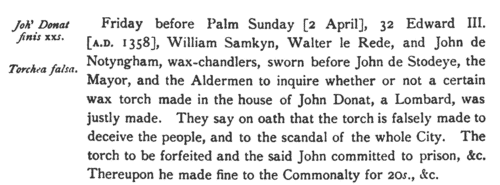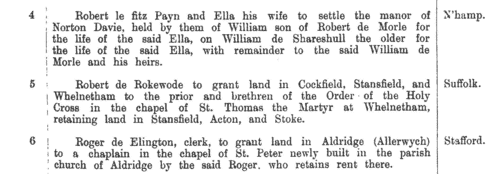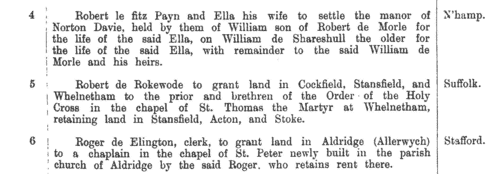Baa Surname Ancestry ResultsOur indexes 1000-1999 include entries for the spelling 'baa'. In the period you have requested, we have the following 20 records (displaying 11 to 20): Buy all | | | Get all 20 records to view, to save and print for £88.00 |
These sample scans are from the original record. You will get scans of the full pages or articles where the surname you searched for has been found. Your web browser may prevent the sample windows from opening; in this case please change your browser settings to allow pop-up windows from this site. Clergy, the religious and the faithful in Britain and Ireland
(1342-1362)
These are abstracts of the entries relating to Great Britain and Ireland from the Regesta of popes Clement VI and Innocent VI, from the period when the papal court was resident at Avignon. Many of these entries relate to clerical appointments and disputes, but there are also indults to devout laymen and women for portable altars, remission of sins, &c. This source is particularly valuable for Ireland, for which many of the key government records of this period are lost. Clement VI was consecrated and crowned 19 May 1342 (the day from which his pontificate is dated); Innocent VI was crowned 18 December 1352 and died 12 September 1362. The extracts were made by W. H. Bliss and C. Johnson from Regesta cxxxvii to ccxliv, and published in 1897. The registers are almost complete for these two pontificates. At his accession, Clement VI promised to grant benefices to all poor clerks who should come to Avignon and claim them within two months of his coronation. As many as 100,000 are said to have come, and the register for the first year of his pontificate runs to twelve volumes.BAA. Cost: £4.00.  | Sample scan, click to enlarge

| Payments by the English crown
(1370)
The Exitus or Issue Roll of the Exchequer, compiled by the Clerk of the Pell, recorded all issues or payments made by the English crown: presents of plate and jewellery to foreign nobility; household payments to officers and servants; wardrobe payments; alms; payments for the upkeep of royal palaces, manors, residences and chapels; repayments of loans to the king; payments to messengers and couriers; wages of mercenaries; the upkeep of the navy; ransoming of hostages; maintenance of castles, forts, garrisons and fortifications; salaries of judges and other officers of the courts of Chancery, Exchequer, King's Bench and Common Pleas; as well as a host of miscellaneous other items. This is a translation of the text of the roll for the 44th year of the reign of king Edward III, when Thomas de Brantingham, Bishop of Exeter, was Lord High Treasurer of England.
BAA. Cost: £4.00.  | Sample scan, click to enlarge

| Inhabitants of London
(1352-1374)
Letter Book G of the City of London contains enrolments of recognizances between inhabitants, particularly citizens, for sums of money lent or due; grants of pieces of land or property; and various records relating to the city administration.
BAA. Cost: £4.00.  | Sample scan, click to enlarge

| Fine Rolls
(1369-1377)
The fine rolls of the 43rd to 51st years of the reign of king Edward III record part of the government administration in England, with orders sent out day by day to individual officers, and commitment of particular responsibilities and duties. There is also some material relating to Wales, Scotland, Ireland and the English possessions in France. BAA. Cost: £4.00.  | Sample scan, click to enlarge

| Inhabitants of Yorkshire: Claro wapentake
(1379)
The poll tax returns for this wapentake, the area around Aldborough, Boroughbridge, Knaresborough and Wetherby.BAA. Cost: £6.00.  | Sample scan, click to enlarge

| Fine Rolls
(1377-1383)
The fine rolls of the 1st to 6th years of the reign of king Richard II record part of the government administration in England, with orders sent out day by day to individual officers, and commitment of particular responsibilities and duties. There is also some material relating to Wales, Scotland, Ireland and the English possessions in France. BAA. Cost: £4.00.  | Sample scan, click to enlarge

| Inhabitants of Cambridge
(1298-1389)
'Cambridge Gild Records' was edited by Mary Bateson for the Cambridge Antiquarian Society, and printed in 1903. Several important records for the town are brought together: minutes of the Gild of St Mary in the church of St Mary in the Market Place, 1298-1319 (pages 1-13); bede rolls of the same of around 1349 (14-25); minutes of the Gild of Corpus Christi in the church of St Bene't (26-62); returns for all the Cambridge gilds in 1389 (63-128); a calendar of deeds connected with the gilds of St Mary and Corpus Christi (129-150); and also a subsidy roll for the borough, listing householders in the 8th year of king Edward II (1314-1315) (151-157). The gild minutes include lists of persons entering the gild, usually paying a certain amount for alms and for wax for lights (candles). The bede rolls list prayers for the souls of the deceased, using the formula 'pro anima ..... (et ..... uxoris ejus)', 'for the soul of ..... (and of ..... his wife)'. Dates are not generally given, but most of the entries in these bede rolls are from 1349 to 1352. BAA. Cost: £4.00.  | Sample scan, click to enlarge

| Grantees of offices, commissions and pardons
(1413-1416)
The Patent Rolls are the Chancery enrolments of royal letters patent. Those for the 1st, 2nd and 3rd years of the reign of king Henry V (21 March 1413 to 20 March 1416) were edited for the Public Record Office by R. C. Fowler, and published in 1910. The main contents are royal commissions and grants; ratifications of ecclesiastical estates; writs of aid to royal servants and purveyors; and pardons. The commissions of the peace issued for the English towns and counties and entered on the rolls, being largely repetitive, have been consolidated in a single appendix.BAA. Cost: £2.00.  | Sample scan, click to enlarge

| Landowners and tenants in Bedfordshire
(1345-1485)
Inquisitions ad quod damnum were held by the appropriate sheriff or escheator (or other officer in whose bailiwick the matter in question might lie) to investigate cases in which the royal or public interest might be damaged by proposed alienation or settlement of land (especially alienation to religious uses, into mortmain). The key findings from these inquisitions were as to the tenure of the land and the service due from it; its yearly value; the lands remaining to the grantor, and whether they sufficed to discharge all duties and customs due from him; and whether he can still be put upon juries, assizes and recognitions, so that the country be not burdened by his withdrawal from them. Generally speaking, this process had the makings of a system of licensing such alienations, and raising money in proportion to the valuations. Equally, there are many items that deal with subjects such as the closing of public roads, the felling or inclosing of woods, or the proposed grant of liberties or immunities. A calendar of these inquisitions from the 19th year of the reign of king Edward III to the 2nd year of Richard III was prepared by the Public Record Office and published in 1906. We have now indexed this calendar by surname and county. Most of the individuals appearing in the calendar are either pious individuals seeking to make grants to religious bodies for the sake of their souls; or landowners securing the disposition and settling of their real estate. But some other names do appear - tenants, trustees, chaplains and clerks.BAA. Cost: £6.00.  | Sample scan, click to enlarge

| Landowners and tenants in Huntingdonshire
(1345-1485)
Inquisitions ad quod damnum were held by the appropriate sheriff or escheator (or other officer in whose bailiwick the matter in question might lie) to investigate cases in which the royal or public interest might be damaged by proposed alienation or settlement of land (especially alienation to religious uses, into mortmain). The key findings from these inquisitions were as to the tenure of the land and the service due from it; its yearly value; the lands remaining to the grantor, and whether they sufficed to discharge all duties and customs due from him; and whether he can still be put upon juries, assizes and recognitions, so that the country be not burdened by his withdrawal from them. Generally speaking, this process had the makings of a system of licensing such alienations, and raising money in proportion to the valuations. Equally, there are many items that deal with subjects such as the closing of public roads, the felling or inclosing of woods, or the proposed grant of liberties or immunities. A calendar of these inquisitions from the 19th year of the reign of king Edward III to the 2nd year of Richard III was prepared by the Public Record Office and published in 1906. We have now indexed this calendar by surname and county. Most of the individuals appearing in the calendar are either pious individuals seeking to make grants to religious bodies for the sake of their souls; or landowners securing the disposition and settling of their real estate. But some other names do appear - tenants, trustees, chaplains and clerks.BAA. Cost: £6.00.  | Sample scan, click to enlarge

|
 | 1 | 2 |
Research your ancestry, family history, genealogy and one-name study by direct access to original records and archives indexed by surname.
|












